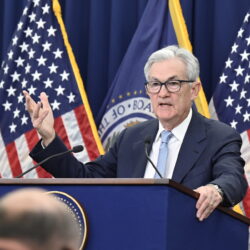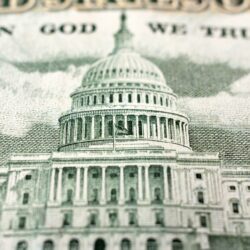
Inflation Remained Elevated in February
“Market participants continue to expect three cuts this year — and that those cuts will begin in the first half of the year. But they have adjusted the odds.” ~William J. Luther
Monetary policy influences inflation, employment, and economic activity. A stable but dynamic monetary system is vital for supporting economic growth, individual liberty, and a prosperous society. Therefore, we examine the causes and consequences of monetary policy (including inflation), identify ideal and practical steps towards a better monetary policy regime, and look at monetary alternatives and financial regulation.
TL Hogan
OP-1793,'Principles for Climate-Related Financial Risk Management for Large …, 2023
Cryptocurrencies, Blockchain, and Public Choice
RM Yonk, D Waugh
Cryptocurrency Concepts, Technology, and Applications, 2023
General Institutional Considerations of Blockchain and Emerging Applications
PC Earle, DM Waugh
The Emerald Handbook on Cryptoassets: Investment Opportunities and …, 2023
The Value of Bitcoin in the Year 2141 (and beyond!)
JR Hendrickson, WJ Luther
The Economics of Blockchain and Cryptocurrency, 51-68, 2022
War, money & economy: Inflation and production in the Fed and pre-Fed periods
TL Hogan, DJ Smith
The Review of Austrian Economics, 1-23, 2022

“Market participants continue to expect three cuts this year — and that those cuts will begin in the first half of the year. But they have adjusted the odds.” ~William J. Luther

“The unique value of Chancellor’s book, beyond tracing this intellectual history of interest and illustrating it by financial debacles up and down the centuries, is to connect the social and market outcomes with the broken money markets.” ~Joakim Book

“If Congress could balance its budget, which hasn’t happened since 2001, it would remove a bullet the Fed could shoot at the economy.” ~Vance Ginn

“Today the world still benefits from monetary and financial innovations begun in China, then picked up and carried like a baton in Renaissance Europe.” ~Paul McDonnold

” Fed watchers expect the Federal Open Market Committee will keep rates steady when they meet on March 19-20. In light of the CPI data, that’s a defensible move.” ~Alexander W. Salter

“While tailwinds from normalizing supply chains are cooling goods prices, concerns linger about the sustainability of this trend. In particular, the February CPI readings strongly suggest that the January updraft was not anomalous.” ~Peter C. Earle
250 Division Street | PO Box 1000
Great Barrington, MA 01230-1000
Press and other media outlets contact
888-528-1216
press@aier.org
This work is licensed under a
Creative Commons Attribution 4.0 International License,
except where copyright is otherwise reserved.
© 2021 American Institute for Economic Research
Privacy Policy
AIER is a 501(c)(3) Nonprofit
registered in the US under EIN: 04-2121305